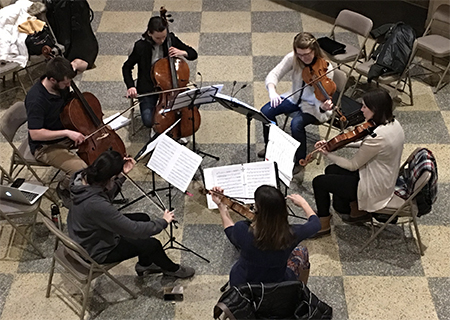by Nicholas Stevens

By playing these string sextets in Tucker Hall, a high-ceilinged room in St. Paul’s Episcopal Church in Cleveland Heights, the pared-down iteration of the group that greeted audiences on February 16 guaranteed an immersive experience. David Ellis, the founder, director, and (on this occasion) second cellist of the group, decided that a non-traditional seating arrangement would suit the material — in a circle, with the audience dispersed across sides of a surrounding square. This proved effective.
Borodin, like most members of Russia’s nationalist “Mighty Five,” came to composition without a grounding in Western European academic style. The ultra-nationalists of the Five would come to consider their eschewal of French, German, and Italian training a mark of pride — a political statement. Yet initially, and in this unfinished and posthumously published sextet, Borodin thought of his distinct style as simply the way things were done.
The players treated the piece’s two movements, an Allegro and an Andante, as opportunities to give the composer’s melodies warmth. Violinist Yeon Sun Huh and cellist Nataliya Pshenychna rendered solos with sensitivity and style, and violists Anna Gerber and Elizabeth Keckeisen cohered as a section throughout. Borodin would go on to create orchestral and operatic music of uncommon power and influence, but this early work sounds very much like a draft.
Rimsky-Korsakov, in danger of expulsion from the Five by the mid-1870s, had committed two cardinal sins: taking lessons in Western harmony and counterpoint, and excelling at them. Borodin and his colleagues therefore looked askance at works like the Sextet in A. With an opening movement that evokes Beethovenian springtime, a rondo fugato second movement that fairly overflows with technical tricks, and a central scherzo marked by clever contrasts of tempo, the Sextet sounds like its composer’s work, but lacks some of the melodic charm that characterizes better-known pieces like Scheherazade.
As its texture grew more complex, the fourth movement threatened to come apart entirely. Whether the players felt it or not, the accumulated tension of this near-foundering achieved release in the fifth movement, a propulsive exercise in finale form. Anna Gerber held the rest of the ensemble in the palm of her hand at the moment in which Rimsky-Korsakov, allowing the music to wither for a moment, leaves the violas in charge.
If the Borodin and Rimsky-Korsakov pieces afforded glimpses of developing composers who still had things to learn, then Souvenir de Florence, Tchaikovsky’s final chamber work, served as the evening’s composition masterclass. A cosmopolitan tour de force inspired by Italy, Souvenir found the players at the top of their game in this performance.
Switching from second to first violin, Stefanie Schore led the ensemble into the swirling turbulence of the opening movement with the sort of energy that Tchaikovsky’s stormiest music demands, and displayed masterfully expressive timing amid the rhythmic tensions of the opening of the Adagio. Nataliya Pshenychna, showing noble restraint in solo moments, captured the more elegant, intellectual side of Tchaikovsky’s music. The Allegretto had a balletic lightness, and from its taut opening to its bursting-flashbulb last chords, the concluding Allegro stood as a reminder that even moments of profound division and debate can produce stunning statements of clear, coherent vision.
Published on ClevelandClassical.com February 21, 2018.
Click here for a printable copy of this article



